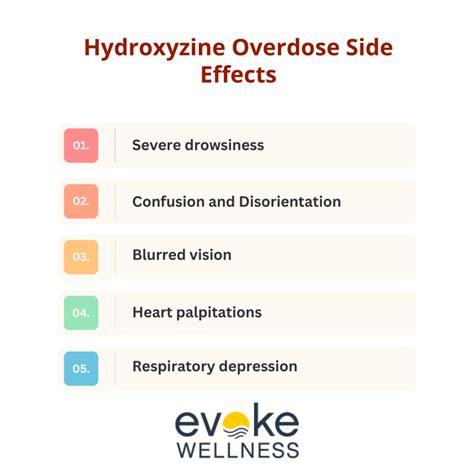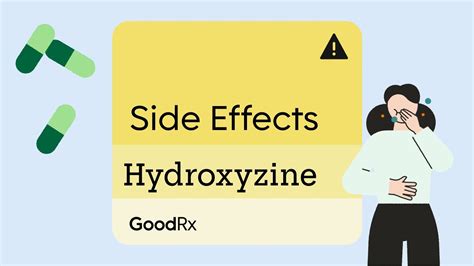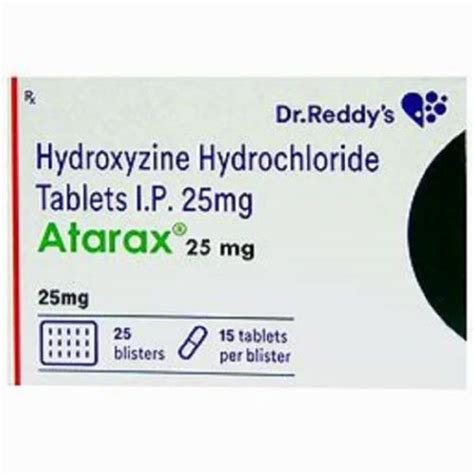Intro
Discover Hydroxyzine side effects, including drowsiness, anxiety, and allergic reactions. Learn about common and rare effects, interactions, and precautions to minimize risks and ensure safe usage of this antihistamine medication.
Hydroxyzine is a medication that has been widely used for its antihistamine, anti-anxiety, and sedative properties. It is often prescribed to treat conditions such as itching, hives, and anxiety disorders. However, like all medications, hydroxyzine can cause a range of side effects, some of which can be serious. In this article, we will delve into the potential side effects of hydroxyzine, exploring both the common and rare effects, as well as discussing the importance of monitoring and managing these side effects.
Hydroxyzine has been a staple in the medical community for decades, and its effectiveness in treating various conditions has made it a popular choice among healthcare professionals. However, the medication's side effect profile is complex, and patients should be aware of the potential risks associated with its use. By understanding the possible side effects of hydroxyzine, individuals can make informed decisions about their treatment and work closely with their healthcare providers to minimize any adverse effects.
The use of hydroxyzine is not without controversy, and some patients have reported severe side effects that have significantly impacted their quality of life. While these cases are rare, they highlight the importance of careful monitoring and management of hydroxyzine therapy. As research continues to uncover the full scope of hydroxyzine's side effects, it is essential for patients, healthcare providers, and researchers to collaborate in ensuring the safe and effective use of this medication.
Common Side Effects of Hydroxyzine

Hydroxyzine's common side effects can be mild to moderate in severity and may include drowsiness, dry mouth, and dizziness. These effects are often transient and may resolve on their own as the body adjusts to the medication. However, in some cases, these side effects can be persistent and may require dose adjustments or alternative treatments.
Some of the most frequently reported common side effects of hydroxyzine include:
- Drowsiness and sedation
- Dry mouth and throat
- Dizziness and lightheadedness
- Headaches and fatigue
- Nausea and vomiting
- Constipation and diarrhea
It is essential to note that these side effects can vary in severity and may be influenced by individual factors, such as age, health status, and concomitant medications.
Rare but Serious Side Effects of Hydroxyzine

While rare, hydroxyzine can cause serious side effects that require immediate medical attention. These effects may include allergic reactions, cardiac arrhythmias, and seizures. In some cases, hydroxyzine can also exacerbate underlying medical conditions, such as glaucoma, urinary retention, and respiratory depression.
Some of the rare but serious side effects of hydroxyzine include:
- Allergic reactions, such as anaphylaxis and angioedema
- Cardiac arrhythmias, including QT prolongation and torsades de pointes
- Seizures and convulsions
- Respiratory depression and arrest
- Urinary retention and glaucoma
If you experience any of these side effects, it is crucial to seek medical attention immediately.
Long-Term Side Effects of Hydroxyzine

Prolonged use of hydroxyzine can lead to long-term side effects, some of which can be severe and debilitating. These effects may include dependence, withdrawal symptoms, and cognitive impairment.
Some of the long-term side effects of hydroxyzine include:
- Dependence and addiction
- Withdrawal symptoms, such as anxiety and insomnia
- Cognitive impairment and memory loss
- Mood changes and depression
- Sleep disturbances and insomnia
It is essential to use hydroxyzine only as directed and to monitor your response to the medication closely.
Managing Hydroxyzine Side Effects

While hydroxyzine can cause a range of side effects, there are strategies to manage and minimize these effects. By working closely with your healthcare provider, you can develop a treatment plan that balances the benefits of hydroxyzine with the risks of side effects.
Some tips for managing hydroxyzine side effects include:
- Taking the medication as directed and not exceeding the recommended dose
- Monitoring your response to the medication and reporting any side effects to your healthcare provider
- Adjusting the dose or switching to an alternative medication if side effects are severe or persistent
- Practicing good sleep hygiene and avoiding activities that can exacerbate side effects, such as driving or operating heavy machinery
By being proactive and informed, you can minimize the risks associated with hydroxyzine and maximize its benefits.
Hydroxyzine Interactions and Contraindications

Hydroxyzine can interact with various medications and substances, increasing the risk of side effects and adverse reactions. It is essential to inform your healthcare provider about all medications, supplements, and substances you are using before starting hydroxyzine therapy.
Some of the medications and substances that can interact with hydroxyzine include:
- Central nervous system depressants, such as benzodiazepines and opioids
- Antihistamines and decongestants
- Muscle relaxants and sedatives
- Certain antibiotics and antifungals
- Grapefruit and grapefruit juice
Additionally, hydroxyzine is contraindicated in certain individuals, including those with a history of hypersensitivity reactions, glaucoma, and urinary retention.
Special Considerations for Hydroxyzine Use

Hydroxyzine use requires special consideration in certain populations, including pregnant and breastfeeding women, children, and older adults.
Some of the special considerations for hydroxyzine use include:
- Pregnant and breastfeeding women: Hydroxyzine should be used with caution, as it can pass into breast milk and affect the fetus.
- Children: Hydroxyzine should be used with caution, as it can cause paradoxical reactions, such as excitement and agitation.
- Older adults: Hydroxyzine should be used with caution, as it can increase the risk of falls, cognitive impairment, and other age-related complications.
By being aware of these special considerations, you can use hydroxyzine safely and effectively.
Conclusion and Future Directions

In conclusion, hydroxyzine is a medication with a complex side effect profile, and its use requires careful consideration and monitoring. By understanding the potential side effects, interactions, and contraindications, individuals can make informed decisions about their treatment and work closely with their healthcare providers to minimize any adverse effects.
As research continues to uncover the full scope of hydroxyzine's side effects, it is essential for patients, healthcare providers, and researchers to collaborate in ensuring the safe and effective use of this medication. By prioritizing patient safety and well-being, we can maximize the benefits of hydroxyzine while minimizing its risks.
What are the most common side effects of hydroxyzine?
+The most common side effects of hydroxyzine include drowsiness, dry mouth, and dizziness. These effects are often mild to moderate in severity and may resolve on their own as the body adjusts to the medication.
Can hydroxyzine cause serious side effects?
+Yes, hydroxyzine can cause serious side effects, including allergic reactions, cardiac arrhythmias, and seizures. These effects are rare but require immediate medical attention.
How can I manage hydroxyzine side effects?
+To manage hydroxyzine side effects, it is essential to take the medication as directed, monitor your response, and report any side effects to your healthcare provider. You can also practice good sleep hygiene, avoid activities that can exacerbate side effects, and adjust the dose or switch to an alternative medication if necessary.
We hope this article has provided you with a comprehensive understanding of hydroxyzine's side effects and has empowered you to make informed decisions about your treatment. If you have any questions or concerns, please do not hesitate to comment or share this article with others. By working together, we can prioritize patient safety and well-being, ensuring the safe and effective use of hydroxyzine and other medications.
